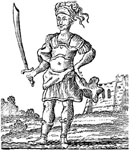
On the Difference Between a Hero & an Apostle
GUEST COLUMN
“I die daily.” 1 Corinthians 15, verse 31. I don’t know how these words signify in Greek, but in English they sound forth. They ring. They have weight enough to bend space and time. They tell of forthrightness, of terminal-ward sobriety and cheer. Like Abraham’s “Here am I,” they speak an inaugural, even annunciatory power into being. Hence it comes as something of a surprise to discover that the editors of my copy of the Revised Standard Version gloss St. Paul’s statement as follows: “i.e., I risk death, every day.” This certainly makes one kind of sense, given the context, but Paul says “I die,” which is something very different. It is only in the next verse that he tells how he risks death by stoning or some such thing, and, as if to underscore the change in sense, he prefaces this latter remark with the words, “humanly speaking.” Implicit is the notion that when he says, “I die daily,” he speaks as a “new being,” one who cannot be regarded from a “human point of view,” certainly it follows that his words should not be glossed from a human point of view.
“I risk death” is a heroic statement. But “I die daily” — this is creedal. The more one waits on this phrase and lets it reverberate, the more one realizes that it focuses not just Paul the man but also a whole theology — through death, life. And if one waits long enough, one realizes that the very ambiguity of the phrase is its sweetest asset: We glimpse the meaning of “I die daily” by sorting out from it the meaning of “I risk death.”
It is no secret that around or near death, life takes on intensity. War journalists, parousiacs, people in hurricanes, Heideggerians — all testify, according to their secret and not so secret desires, to a craving for an ultimate occasion, an end in the face of which a life can be seen to matter. War correspondents grow addicted to the adrenaline charge afforded by a visit to “the front”; during hurricanes even miserly people have been known to turn into veritable founts of comradeship and joy; Heideggerians strive to “think” the fact of mortality and so to live each moment “authentically,” as though it were the last granted. In each instance, life is made precious in contradistinction to death. Time slows and small details grow luminous to a degree that is directly proportionate to the force with which death pushes against the person doing the perceiving. D.H. Lawrence perfectly epitomized this attitude when, in a famous salute to alpine climates, he tells how “a man must needs live under the radiance of his own negation,” and it is no accident that Lawrence longed, throughout his life, for apocalypse. It’s a kind of eroticism, this perspective. To the extent that one equates life with risking death and so sets life against death, one reduces life to the spark generated by two opposites simply juxtaposed.
You May Also Enjoy
"Harden not your hearts! And soften not your seats."
Hoping that all will be saved – when Scripture says that some are lost – is like hoping that no one ever sins when we know that Adam and Eve sinned.
Why must there be empires that brook no challengers, empires that use genocide to clear land as a matter of course? Because evil must be checked.

